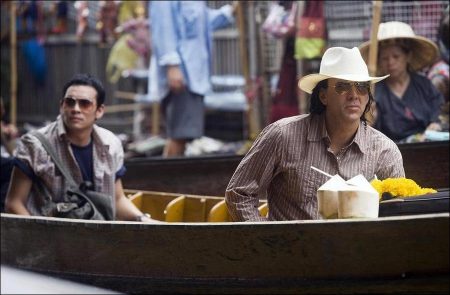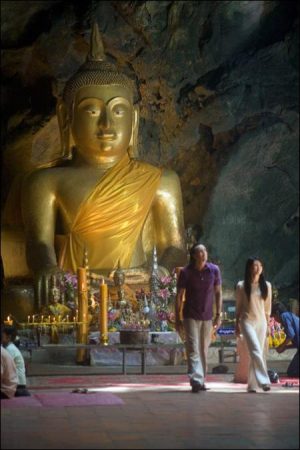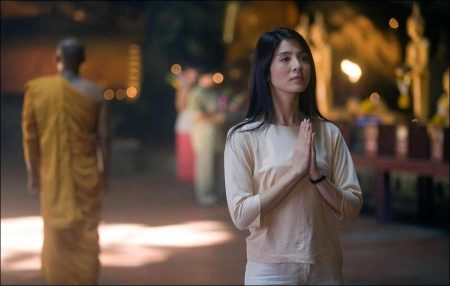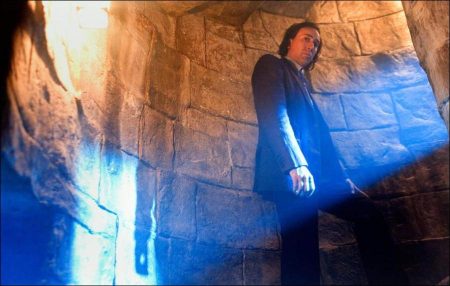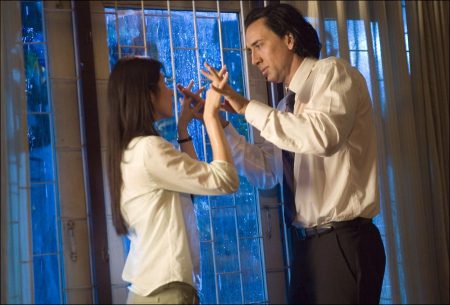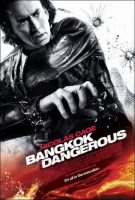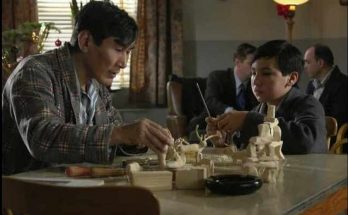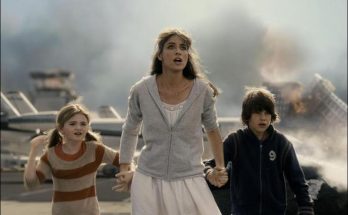Tagline: It’s all in the execution.
Bangkok Dangerous movie storyline. The life of an anonymous assassin takes an unexpected turn when he travels to Thailand to complete a series of contract killings. Joe (Nicolas Cage), a remorseless hitman, is in Bangkok to execute four enemies of a ruthless crime boss named Surat. He hires Kong (Shahkrit Yamnarm), a street punk and pickpocket, to run errands for him with the intention of covering his tracks by killing him at the end of the assignment.
Strangely, Joe, the ultimate lone wolf, finds himself mentoring the young man instead whilst simultaneously being drawn into a tentative romance with a local shop girl. As he falls further under the sway of Bangkok’s intoxicating beauty, Joe begins to question his isolated existence and let down his guard …just as Surat decides it’s time to clean house.
As Bangkok Dangerous begins, a black van winds its way through the city of Prague flanked by police escorts. Its cargo: a one time Russian gangster turned police informant. From the city’s cathedral bell tower, the convoy is being watched by Joe (Nicolas Cage), an anonymous gunman who tracks his prey through a high-powered rifle sight all the way to a police interrogation room.
As the cathedral bell rings to mark the hour, Joe fires two shots, killing the informant instantly. The assassin disappears into the crowded Czech streets, first getting rid of his weapon and then his equally disposable assistant, leaving no trace of his presence.
A cold, ruthless and utterly efficient killer for hire, Joe next arrives in the heart of the gaudy, gritty red light district of Bangkok. Hired by a brutal gangster, Surat, to carry out four murders, his first order of business is to find an accomplice who will preserve his anonymity and act as go-between-one who won’t be missed when Joe cleans up again. He recruits Kong (Shahkrit Yamnarm), a skinny street rat and action movie enthusiast, to be his errand boy.
Kong’s primary responsibility is retrieving the hit instructions in a locked metal briefcase from Surat’s emissary, a gorgeous exotic dancer named Aom (Panward Hemmanee). He becomes instantly infatuated with her, courting her with stolen goods, but she reacts only with amused contempt.
Joe carries out his first meticulously planned hit on the Minister of the Interior in the bustling Bangkok streets, but is slightly injured while escaping. When he goes to a drug store for a bandage, Joe finds himself uncharacteristically drawn to a shy, pretty, deaf mute pharmacist named Fon (Charlie Young). The girl, a complete innocent, takes him home to meet her grandmother and, to Joe’s astonishment, a sweet romance blossoms.
When Kong retrieves the instructions for Joe’s next assignment, he is attacked by a gang of street thugs who smash open the briefcase, and Kong discovers Joe’s profession. Now in awe of his American employer, he begs to be trained to fight. Joe’s instincts tell him to kill his assistant on the spot, but something in Kong touches him and he takes the young man under his wing.
Embarking on an intense physical and psychological training regimen, Joe gradually allows Kong to get closer to him than anyone has before, even to the point of letting him tag along on an assignment. Joe’s second target is a vicious gangster and a competitor of Surat’s. To make the man’s death look accidental, Joe stages a drowning in a hotel swimming pool. A third hit takes a dramatic turn when the victim leads the pair on a high speed chase, involving traditional wooden boats and a motorcycle, through the canals of Thailand’s famed Damnoen Saduak Floating Market.
As Kong’s education continues, his confidence grows and so does his love affair with Aom. The pair begins to use information drops as an excuse for romantic rendezvous, and the bond between them deepens. Fon and Joe become increasingly involved, as well, with Joe spending more and more time enjoying his carefree moments. But the spell is broken when the couple is attacked by muggers and Joe slaughters the two men in short order. Fon, seeing Joe for what he is, flees in horror and refuses to see him again.
Despondent over Fon’s rejection, Joe withdraws even from Kong and throws himself back into his work, planning to complete his assignments and disappear in his usual manner – without a trace. He arranges to meet Kong immediately after the final murder, promising to take his helper with him, but intending to kill him.
When Joe’s final target turns out to be a hero of the Thai people whom he is asked to assassinate in the midst of a public rally, Joe demands more money and his employer begins to see him as a liability. The gangster uses Aom to lure Kong to his fortress and threatens to kill her if Kong doesn’t reveal Joe’s identity and whereabouts.
As he’s about to carry out his final assignment, Joe observes the hope in the eyes of the people in the street. He flashes on the faces of his countless victims, then an image of Fon at the moment when she sees him for what he is, the monster he has become.
Remembering clearly the day he first assumed the role of a killer, he is unable to pull the trigger. As he retreats, a police sniper sees the barrel of his gun, and Joe is instantly engulfed in a barrage of ricocheting bullets.
Joe manages to escape, but only to find himself the object of sweeping manhunts by both Surat and the police. Before making his way out of Bangkok, however, he realizes he has business to attend to: He must rescue Kong and Aom and destroy Surat, even it means sacrificing himself.
About the Production
“No one knows who I am. No one knows where I am.” – JOE
In 2005, while preparing to work with Hong Kong-based filmmakers Oxide and Danny Pang on their first English language film, The Messengers, producers William Sherak and Jason Shuman decided to screen the rising stars’ entire body of work. They were bowled over by what they saw.
One film in particular fascinated Sherak and Shuman: the original Thai language film Bangkok Dangerous. A dark and surprising thriller about a deaf mute hitman and his apprentice, Bangkok Dangerous was released in 1999 to international critical acclaim and had appeared at a number of international film festivals, even winning the International Critics Award (FIPRESCI) at the 2000 Toronto International Film Festival.
Sherak says he and his partner knew immediately the film would translate brilliantly to an English-language remake. “We became big fans of the original Bangkok Dangerous. As we got to be friends with the Pangs, Jason and I told them we thought it was a really interesting story that should be remade in English.”
For their parts, the Pangs were equally intrigued. Identical twins born in Hong Kong, the brothers have made several cult favorite films including The Eye, a supernatural thriller recently remade in English starring Jessica Alba and produced by Tom Cruise.
This time, however, the Pangs were being offered a rare opportunity to recreate their own film. “We thought it would be an interesting challenge to update the concept after more than six years,” says Oxide Pang. “We were able to take the same concept, the same idea, refine it considerably and bring it to a bigger audience.”
To adapt the original film, Sherak and Shuman brought on Jason Richman, writer of the 2002 action comedy Bad Company, starring Chris Rock and Anthony Hopkins. In addition to updating the story, the producers wanted to make sure that Richman captured an accurate picture of Thai culture, so they arranged for him to spend time in Bangkok and experience it first-hand.
“We came out to Thailand for about a week to do a research trip,” Richman remembers. “Once we were there, the script came to me very fast. It certainly didn’t take as long as usual. I think the opportunity to meet the people and to experience the city beyond all the usual tourist locations gave me much of the inspiration I needed.
“The time I spent there was instrumental in opening my eyes to how beautiful the people and culture are in Thailand. Coupling the peaceful nature of the country and the actions of a killer for hire was a wonderful exercise for me,” he says.
The producers were delighted with the script. “It’s a very simple story, told very well,” says Sherak. “Nowadays, we see movies that have such complicated plots that we lose much of the characterization. What Jason did is make the plot easy to follow and very simple so the audience can focus on these interesting characters and their lives from the beginning to the end of the movie.”
The Pang Brothers were pleasantly surprised by the streamlined development process. “I had heard that normally there are multiple writers involved with Hollywood scripts,” says Danny. “Jason took this one from the first draft to the final draft and brought us a no nonsense script that was true to the original movie.”
From the project’s inception, Richman, Sherak and Shuman felt there was only one actor who could do justice to the role of Joe. “We had Nicolas Cage in mind for Joe while we were developing the script,” says Sherak. “The character of Joe does not have a lot of dialogue, so we needed an actor who could use his aura and inner life to convey emotions. Nic is perfect for that.”
Cage, an aficionado of Asian cinema who had worked with Hong Kong action maestro John Woo on the hit film Face/Off, was already an admirer of the Pang Brothers’ work in general and of Bangkok Dangerous in particular.
“What I liked about the original movie was the style and the editing and the pacing of the film. When I saw the new script, I was intrigued by the relationship between my character, Joe Ender, and Shahkrit’s character, Kong, as a teacher-student relationship that ultimately becomes a friendship. I always think it’s interesting to see different cultures cooperating, co-existing and getting along.”
Producer Norm Golightly, president of Cage’s production company, Saturn Films, adds: “We thought it would be fantastic to combine a big Hollywood star with (some) authentic Asian filmmaking. It’s a really fresh experience for Nic and I to be on someone else’s turf – working the way they work, doing things the way they do things.”
While landing a star of Cage’s caliber was an enormous boost for the film, it also raised interesting questions about the best way to adapt the script. In the original version of the film, Joe is deaf and mute-disabilities which underscore his isolation. “We had seen a lot of movies about killers and we thought they were wasting too much time talking,” explains Oxide. “We thought that in reality, a killer wouldn’t speak a lot, he would need to focus all his time and attention on his target. The idea of a deaf mute killer came from that.”
In the new film, however, the character’s isolation comes not from a physical limitation but from his inability to speak Thai and his unfamiliarity with the local culture. “We decided that coming to Bangkok as a westerner and not speaking the language created a similar distance between Joe and his surroundings. Thai is such a hard language to pick up, you’re almost as lost as if you can’t speak or hear.”
In a reference to the original film though, Richman decided to include a deaf-mute character – Fon. Fon is a beautiful young woman, whose instant connection with Joe underscores their mutual isolation especially because of the difficulty of communication from both sides. “I really like the bond between Nic’s character and Fon,” says the screenwriter. “It’s a unique relationship-a sincere love story-and it was great fun to work on.”
“The eyes tell you everything.” – JOE
Having teamed up for more than a dozen movies to date, twin directors Oxide and Danny Pang have developed a unique approach of collaborating that would probably be impossible for filmmakers who do not share the same DNA.
“It’s like we just combine all of our two powers to become one,” says Oxide. “We work on the script together and then put together storyboards for the film.”
“When we finish this procedure, we can work separately because we both have the same idea of what should be happening,” adds Danny. “On any given day, maybe I’ll be shooting, tomorrow it might be Oxide. If it’s not a big scene, normally we will separate.”
Sherak marvels at the brothers seeming ability to read each others’ minds, even when they weren’t on set at the same time. “What amazed everyone on the team is the connection between Danny and Oxide. “You can talk to one of them on Monday and finish the conversation with the other one on Tuesday and they’re both in the exact same place. It’s very weird, but it makes it easier because they can work on alternate days and build on each other’s work seamlessly. Despite some differences in personality, they seem to think exactly alike when it comes to directing.”
Production designer James Newport concurs that working with two directors was very different from anything he had experienced before. “There seems to be a psychic connection between the two of them, they can almost finish each other’s sentences. If you can’t find Oxide, you go and ask Danny, and he seems to know what you’re talking about even if you never talked with him about it before. They seem to have taken each task and divided it right down the middle.”
One thing the Pangs agreed on was that they were thrilled to be working with Nicolas Cage, an actor who Danny calls “one of our idols in the movie world.”
“I’ve loved his work since Birdy, directed by Alan Parker. I don’t know if a lot of people are familiar with this movie, but I remember first seeing him in this.”
Oxide adds that Cage was a dream to work with. “We were making changes to the story as we went along, and Nic was always open to our ideas and our direction,” he says. “Our English is not too good, but he spent the time to try to understand what we were saying. We never felt like we were directing a `superstar.’ ”
“Nic Cage is Nic Cage,” says Sherak. “He’s amazing; he’s brought such life to this character. He has the ability to tell an entire story with expressions. He’s playing opposite a character who is deaf-mute, so it’s all about expressions and he really slammed that home.”
Cage says he was fascinated by his character’s many contradictions and complexities. “Joe is coming from a military background, but he’s a killer for hire, a mercenary. He has been beleaguered by family problems his entire life. I would say that he is evil, if I have to label him, and that he is trying to find a way out of that.
“He’s coming out of his of violence, his demons, because of the girl he meets, Fon, and her sensibility, her kindness, and also because of Thailand, because of Bangkok itself. He’s becoming more interested in peace and that’s where the character goes into conflict, because it’s not his nature, he really can’t be peaceful because of what happened to him as a boy.”
Cage has high praise for Charlie Young, the actress cast as his love interest, Fon. “The chemistry with Charlie was terrific, she’s a great lady, she’s kind, she’s charitable and she’s a really good actress,” Cage says.“I think it’s going to be unique. You don’t see a lot of movies where there’s a love story that joins different cultures.”
The producers were equally impressed with the Hong Kong star’s performance. “Charlie Young really brought her A-game,” says Sherak. “I think the scenes with the two of them are exceptional.”
Young learned sign language for her role with the help of Katitha Rattanasin from the National Association of the Deaf. Rattanasin says of the actress, “She’s a fast learner and was extremely committed. Charlie even taped the lessons we had together so she could study on her own later on and communicate with deaf people in real life situations.”
In addition to sign language, Young had to learn how to perform a well known traditional Thai dance. “It was very challenging,” she says. “I had only seven days to practice, and then I had to dance with a group of professionals. Thank goodness I had an excellent teacher and she worked very hard with me.
“When I came to the set that day, I was very nervous because I had had so little practice and I didn’t want to disappoint anyone. My teacher told me in Thai, `I support you all the way. Try your best and you’ll be okay.’ I almost cried at that moment. I knew I was going to do the best I possibly could.”
In terms of character, Young decided not to do a lot of additional preparation for her role, “I feel that sometimes you should not think too much when you read the script. The immediate feeling is more important. I wanted Fon to be as unaffected as possible. I wanted her to appear very natural.”
Conversely, Shahkrit Yamnarm, who plays Kong, immersed himself in the screenplay to develop the role of the hitman’s apprentice. “I did a lot of homework with the script, reading it over and over, memorizing it and getting into the character, getting to know Kong as well as I could, until I became him. I also trained in motorcycle riding and some of the martial arts moves, which was fun.”
Sherak was thrilled with Yamnarm’s performance. “Shahkrit is fantastic, he just really knocked his role out of the park,” says the producer. “He has the potential to be a very big star all over the world, and I hope it happens, because he’s such a great guy and he’s so talented.”
Yamnarm describes his character as a street kid, a hustler, selling cheap watches to tourists. “He’s good at what he does, but living in the big wide world, I don’t think that he’s that smart. He’s not actually a hitman, he’s more of a helper. He doesn’t shoot anyone, but he learns a lot from Joe. There are a lot of emotions, a lot of understanding between these two guys who are totally different, but both are quite isolated from the world. They are men who do what they have to do to survive, that’s what they have in common.”
The actor made the choice not to watch the original Bangkok Dangerous before shooting began. “I was afraid seeing it would influence me and I wanted to make this role my own. I’m going to go watch it after I finish this movie.”
As he carries out his secretive courier duties for Joe, Kong falls in love with Aom, a beautiful “coyote” dancer, who performs in a club in Bangkok’s red light district. Thai television star Panward Hemmanee makes her first film appearance as Aom, who also acts as go between for Joe and his employer. “I auditioned alongside many other actresses,” she recalls. “We had to do a dance scene, it was a bit embarrassing, but I did it.”
“The character I play is both gentle and strong inside,” she says. “When she is at work, she’s super tough, but on the inside, she just wants to be loved like everybody else. It’s a very sexy role. During the dance scene I was afraid that all of the other coyote girls who were dancing beside me would be sexier than me. All the time I was thinking-what do I have to do to be even sexier?!”
Nirattisai Kaljareuk, a well-known Thai actor and director, plays the vicious gangster Surat who hires Joe, without ever meeting him, to slay his enemies. “I studied for the role by watching a lot of mafia movies. Surat is so completely opposite to who I am in real life-it was a great deal of fun to be that evil.”
“The best way to defend yourself is to know when something’s going to happen.” – JOE
The final, and perhaps most intriguing character in the film, is Thailand itself. As producer William Sherak explains, “In our movie, Bangkok is not just a location. The city and the people in Bangkok eventually make our assassin decide he doesn’t want to kill anymore. The culture turns him away from violence and the people he meets make him aware of his own shortcomings. He discovers something we all realized when we first came to Bangkok: This is a magical place.”
Nicolas Cage recalls experiencing that magic as soon as he stepped off the plane. “I felt the air and I thought this place is really beautiful; there’s a great energy here. It’s free. Isn’t that what `Thai’ means, `free’? There was a freedom in the air and there was a kindness that I felt there that I really admired.”
The Pang Brothers made every effort to present an accurate depiction of modern Thailand without romanticizing or mythologizing it “Sometimes a foreign director imagines a country to be a certain way and adds the elements of his imagination. We tried to shoot this movie in the real Thailand, to show the culture of Thailand and the country’s spiritual life.”
The filmmakers incorporated many traditional Thai symbols, including the elephant, which holds special significance to the country’s primarily Buddhist population. Cage was fascinated by one of his pachyderm co-stars, a young elephant that interacts with the crowd.
“I was very touched by that scene,” says the actor. “It was a baby elephant and he was very sweet. He seemed like he was smiling when I was feeding him. I don’t get to act with elephants that often, so it was a highlight for me.”
All in all, the film used about 47 locations in Bangkok and nearby provinces, including the city’s red light district, parks, squatter settlements, business centers, the Chao Phraya’s river banks and luxurious five-star hotel suites. Location manager Andrew Perry observes that in ten years of working in Bangkok, he has never seen a movie do all its shooting there. “The city’s traffic congestion and narrow streets can present a problem for big productions,” he said.
“One of the locations the directors specifically requested was the Kao Luang Temple in Petchburi, about two hours south of Bangkok,” says Perry. “This is for the scene where Fon takes Joe to a temple. It’s deep inside a mountain cave filled with Buddha statues. Sunlight pours down from an opening at the top of the mountain – it makes the cave really, really beautiful.”
The shoot was disrupted briefly by an event no one on the set could have anticipated. Halfway through production, a military coup overthrew Thailand’s prime minister, dissolved Parliament and suspended the country’s constitution temporarily. Thankfully, it was a peaceful overthrow: not a single shot was fired and the set was back up and running the next day.
“Television stations shut off and production halted for an evening, recalls producer Norm Golightly. “I saw some tanks in the streets and feel like I survived a little part of history. We certainly couldn’t know the coup was on the calendar. It would have to be the most unexpected event I’ve experienced, not only on this film, but on any I’ve ever worked on.”
“First time in Bangkok?” – KONG
For James Newport, the show’s production designer, Bangkok Dangerous was a labor of love-love for the Thai capital and its culture. “Thailand is a second home for me and I’ve always wanted to show modern day Bangkok on film. Bangkok stands in for other cities quite often, but today’s Bangkok is a very exciting city, visually, and showing it was a great challenge of the project,” said Newport.
Finding a temporary home in the city for the protagonist provided Newport with an opportunity to blend old and new Thailand. “Joe’s employers got him a place that’s out of the city, very remote,” he says. “There’s some very exciting architecture going up in this town and then we looked back at traditional Thailand and we blended the two.”
One of the most exciting scenes in this movie is also one of the most picturesque, being set in a location unique to Thailand: the Damnoen Saduak Floating Market. In a complex and thrilling set piece, Joe chases an assassination target through the area’s canals. “It took us at least a week to complete the scene,” says Danny Pang. “The market attracts masses of people, which makes it much more difficult to shoot. Nevertheless, the merchants and residents in the area welcomed us warmheartedly, as they understood that this movie is a chance to show the world the charm and beauty of their simple lifestyle.
“We have a wooden boat chase, rarely seen in movies, and also Nic rides a motorcycle chasing after the long-tailed wooden boat. As we like to do, we split the work up, so I shot the boat scene and Oxide the motorcycle scene.”
“The floating market is spectacular; it’s a magical place for an action scene,” says Sherak. “Western audiences aren’t used to seeing anything like it, unless it’s a set, but we didn’t change anything. There are people really there with those grocery carts and those little boats and that’s how they live every day.”
The villain Surat’s fortress captures another facet of Thailand, notes Sherak. “In reality, it’s a tannery. It smelled just terrible, but we thought it was a cool place for the scene. I loved the juxtaposition of the compound itself being so rundown and then Surat’s office at the top of the compound so clean and perfect. It’s a bit like how he views himself versus all the people who work for him.”
Golightly is extremely impressed by the country’s extensive filmmaking resources. “Thailand is lacking nothing in terms of film production. The locations are absolutely unbeatable. This has been about the best experience I have had working on a film in terms of talented and efficient crews. Everyone was absolutely wonderful on our crew from top to bottom.”
“Pain is weakness leaving the body.” -JOE
Golightly observes that while Bangkok Dangerous’ action and unique characters make it an entertaining film, it offers a compelling subtext as well: “There’s a theme of redemption and the idea of second chances running throughout the movie.”
Oxide Pang compares Bangkok Dangerous to Tom Yum Goong, a famous Thai dish. “It’s very spicy and sometimes people fear the spicy, but they’re always tempted by it. When you first taste it, you might be apprehensive because you don’t know what it will be like, but then you sense bit of sour, a bit of sweet, and a bit of spicy as well, like our movie.”
His brother Danny adds, “We know that the audience response is out of our control now, but we hope that after watching the movie, and comparing it to the first, we believe people will think it’s even better.”
While acknowledging that Joe isn’t a role model in the traditional sense, star Nicolas Cage suggests the character’s transformation from hitman to hero can be inspirational for audiences. “People change all the time,” he points out. “Some people don’t believe in change, but I don’t subscribe to that philosophy. I think that people can be awakened through a teacher, or through a romantic experience or just getting off an airplane and feeling what’s in the air.”
Bangkok Dangerous (2008)
Directed by: Oxide Pang Chun, Danny Pang
Starring: Nicolas Cage, James With, Charlie Yeung, Philip Waley, Shaun Delaney, Shahkrit Yamnarm, Panward Hemmanee, Dom Hetrakul
Screenplay by: Jason Richman
Production Design by: James William Newport
Cinematography by: Decha Srimantra
Film Editing by: Mike Jackson, Curran Pang
Costume Design by: Kristin M. Burke
Set Decoration by: Witoon Suanyai
Art Direction by: Arin ‘Aoi’ Pinijvararak
Music by: Murat Özdemir
MPAA Rating: R for violence, language and some sexuality.
Distributed by: Lionsgate Films
Release Date: August 22, 2008
Views: 122
